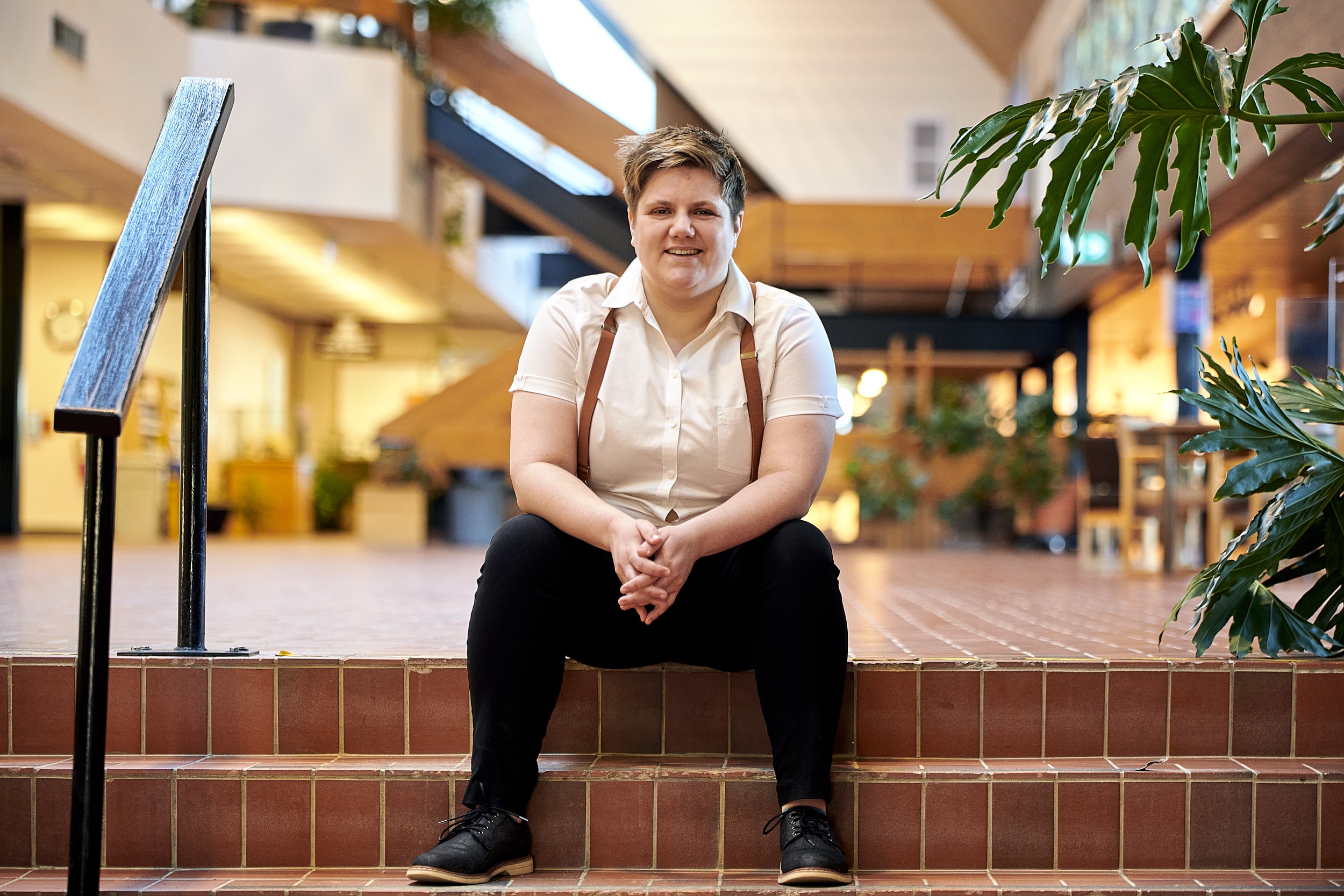Lane Tredger is no stranger to being a queer trail-blazer in Yukon.
Since being elected as the NDP MLA for Whitehorse Centre in 2021, they have fought for queer youth and safe spaces in schools, alongside their work as NDP caucus critic for housing, environment, highways and public works and other portfolios.
Now, Tredger is coming out as non-binary and changing their name and pronouns—making them Yukon’s first out non-binary MLA, and one of a very small handful of out non-binary current and former politicians in Canada, alongside Amita Kuttner, Estefan Cortes-Vargas and Lisa Lachance.
Tredger says it’s time for more queer, trans and non-binary perspectives to be heard in the halls of power, at every level of government.
“I’m usually the only queer person in the room,” says Tredger. “And that’s really strange. Every time something about queer or trans issues comes up, everyone turns and looks at me. And of course, I feel a lot of pressure to try and represent people—and I really do my best to make sure that the voices that aren’t being heard do get heard.
“But I’m only one person, with one set of experiences, and I can’t and shouldn’t try to speak for everybody. My dream is that I’m not the only queer and trans voice in the room. I’m really excited for the day when there are lots of us—because you notice different things; and because there is strength in numbers.”
Mona Luxion is the executive director of Queer Yukon, and a friend of Tredger’s. They say Tredger’s coming out is a proud and important moment for queer Yukoners—and especially significant in the current political climate.
“This is a really important moment for there to be voices for trans and non-binary people in politics,” says Luxion. “I think it’s going to be really meaningful to see someone in politics who has some skin in the game defending our community—someone who actually understands the stakes, as we’re seeing anti-trans hate sweeping across the U.K. and the U.S. and definitely coming to Canada.
“I don’t think any trans or non-binary person owes it to the world to come out publicly, but I’m really grateful for the people who do.… And I also think it says something about the Yukon and the state of politics here that this feels possible. I really hope our community lives up to the trust that Lane is showing in them.”
Tredger hadn’t planned on entering territorial politics—they started their career as a speech therapist, and loved the work. But politics soon became a calling.
“I found that, often, I would call families and say, ‘Hey, do you want to do some speech therapy this week?’ And … I would realize that what they were actually focused on that week was finding a place to live, or trying to figure out how they were going to get food for the week,” says Tredger. “And if you don’t have those basic necessities, not much else feels relevant.”
“There was nothing I could do about it, as a speech therapist. I couldn’t tackle some of the systemic issues that were making it really hard for these kids to thrive. So I decided I wanted to do something … and that landed me in politics.”
Tredger grew up in Yukon, spending much of their childhood living and travelling in remote parts of the territory. They learned to love music from their mother, a music teacher, and could usually be found buried in a book.
“Once, my dad made a bet with me—as a joke—that I couldn’t not read for a whole day,” said Tredger. “And I lost that bet.”
These days, when not at work, Tredger keeps busy playing board games, spending time out in the bush and being obsessed—“probably to an inordinate degree”—with ice cream.
Their love of music has also stayed with them, says Tredger’s partner, Robin Steudel. “When I think of Lane, I think about music—because music is such a big part of their existence and their life,” says Steudel. “Our house is filled with all kinds of instruments, and being around Lane is almost like having a soundtrack to our relationship and our life.”
For Steudel, watching Tredger explore their gender and figure out how they want to be known in the world has been “a lot of fun.”
“It’s very obvious that this has given them a lot of joy,” says Steudel.
Tredger was a teenager when they first started exploring their queerness and gender— questions that would set them down the decades-long path to becoming Lane.
“It’s something I’ve been thinking about for a long time,” says Tredger. “When people call me by my old name and pronouns, it feels like they’re talking about somebody else. And it’s not a bad person—it’s not even a person I don’t like—but it doesn’t feel like they’re talking about me.”
They came across “Lane” when looking through lists of names, and it instantly “felt like it had room for me in it,” said Tredger. “It felt like it had possibility; like there is space for me to pull in all the things I want to be, and all the things I am.”
In time, Tredger says, their decision to come out publicly was no longer a matter of if, but when.
“I was talking with a friend … who asked me, ‘How would you feel if you just set all this to the side, and didn’t do anything, and just kept everything the same?’” Tredger says. “And I realized that it made me feel so sad, and so disappointed.… I only get one life. And I would like to live it the way I want to live it.”
Since sharing their new name and pronouns with some of their colleagues, Tredger says they have received nothing but support.
“One of my coworkers did the sweetest thing,” says Tredger. “She had asked if she could put my new name on my binder that I take into the legislature. And I said, I’m not quite ready yet. So instead, she printed out a picture of a literal country lane and put that on my binder. It was the most touching thing.”
Queer politicians—trans and non-binary politicians in particular—face a unique set of hurdles to running for office and to coming out; including a variety of odd gender-specific procedural quirks.
“One of the first things I noticed when I got elected is that, in the legislature, we referred to each other as ‘Mr.’ or ‘Ms.,’” recalls Tredger. “And I thought, ‘Well, that’s really unnecessary.’ There’s a very obvious non-gendered title for all of us, which is ‘MLA.’” So, soon after their election, Tredger spearheaded the effort to update that rule.
“I did manage to get it changed,” they say. “It was much harder than I thought it was going to be—it actually took a year of meetings and arguments and discussions—but now it has changed, and all the terms we use to refer to people in the legislature are gender neutral.”
Going forward, Tredger is looking forward to keeping up their busy schedule in the legislature, focusing on the growing threat of climate change in the North and the need for affordable housing, as well as being a voice for queer rights throughout the territory. That includes making sure trans people in the territory can access gender-affirming care, which was significantly expanded in 2021, but ran into a legislative issue that forbade the government from paying for services provided by private clinics and providers. Now, Tredger says trans healthcare coverage in Yukon now “seems to be running smoothly again,” and they plan to keep an eye on the issue going forward.
But they are looking forward to doing all this work as Lane Tredger; “unapologetically myself,” they say.


 Why you can trust Xtra
Why you can trust Xtra


